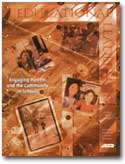As the noninstructional roles of schools have increased, educators have come to realize, "We need all the help we can get."
So said Kay Luzier, chair of the National PTA's education commission. Luzier, an elementary schoolteacher since 1973, remembers that when she started teaching, "we didn't give much credit to the parents' role." But she and other educators have come to realize the importance of parent involvement in education.
Indicators of Effective Parent Involvement
Increased parent and family involvement leads to greater student performance. It's an idea that the National PTA has known and promoted throughout its history. In 1997, the National PTA developed the National Standards for Parent/Family Involvement Programs to help schools, communities, and parenting groups implement effective parent involvement programs with the aim of improving students' academic performance.
The standards build on the six types of parent involvement identified by Joyce L. Epstein of the Center on School, Family, and Community Partnerships at Johns Hopkins University. The standards include (1) regular communication between home and school, (2) support in parenting skills, (3) an emphasis on assisting student learning, (4) the promotion of volunteering at school, (5) parent involvement in school decision making and advocacy, and (6) collaborations with the community to provide needed resources. These standards and their quality indicators mesh with other national standards and reform initiatives in support of children's learning and success. The six standards work together and balance one another, as schools and districts are finding as they begin to adopt them.
A variety of activities that together meet all six standards will produce the greatest results. Although each standard is separate and produces distinct rewards, many individual activities meet two or more standards. For example, a school newsletter produced by parents that includes parenting tips, homework help, information on school board activities, and upcoming events would easily meet the communicating, parenting, volunteering, student learning, and school decision-making standards.
Recommendations
- Create an action team. Involve representatives from each group—parents, educators, administrators, and others—in reaching a common understanding and in setting mutual goals.
- Examine current practice. Survey school staff, community leaders, and parents to ensure a clear understanding of the current status of parent and family involvement.
- Develop a plan of improvement. Based on the evaluation of current practice, identify first steps and priority issues, including developing a parent/family involvement policy. A comprehensive, well-balanced plan should include activities that relate to each standard.
- Develop a written parent/family involvement policy. A written policy establishes the vision, mission, and foundation for future plans.
- Secure support. Keep stakeholders aware of the plan and its progress. Stakeholders include those responsible for implementation, those who will be affected, and those outside the school who may influence the outcome. Secure the financial resources needed.
- Provide professional development for school/program staff. Effective training is essential. The best models of adult education provide staff and volunteers with several opportunities to explore the issues, work together, and monitor and evaluate progress.
- Evaluate and revise the plan. Parent and family involvement is not a one-time goal. It merits a process of continuous improvement and commitment to long-term success.
